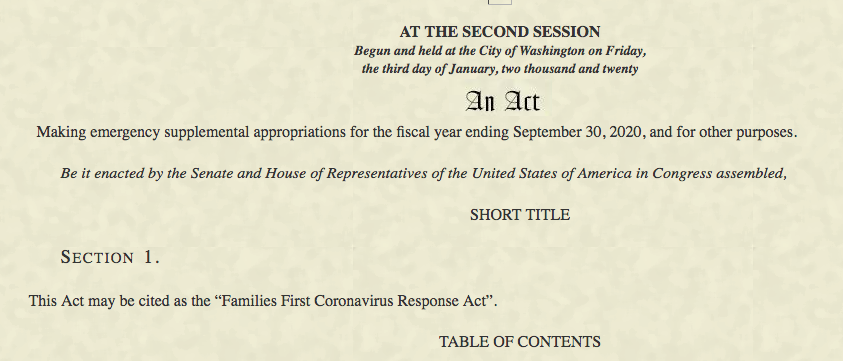- Free Consultation: (631) 352-0050 Tap Here to Call Us
Families First Coronavirus Response Act

On March 18, 2020, President Trump signed into law the Families First Coronavirus Response Act. The law provides for, among other things, leave for employees related to the coronavirus and becomes effective 15 days from March 18. The act provides emergency sick leave, emergency family leave, and tax credits. Like the New York law we blogged about earlier this week, the law’s application varies depending on employer size. The specifics of the law are discussed below.
Sick Leave
The law provides for paid sick leave for some employees. Preliminarily, this portion of the law applies only to employers with less than 500 employees. As to employers who meet this number requirement, employees may qualify for paid sick leave if they meet any of these requirements:
- the employee is subject to a quarantine or isolation order (for coronavirus);
- the employee must self-quarantine per a doctor’s direction;
- the employee has symptoms of the virus (must also seek a medical diagnosis);
- the employee must care for someone who is under quarantine;
- the employee must care for their child because of school closures or regular caregiver unavailability;
- the employee has another hardship specified by designated government agencies.
The law provides for exceptions for some small businesses who can show hardship and some health care workers. The law also provides for job security and sets the amount of wages which can be collected by employees, varying depending on full-time or part-time status, and whether leave is taken because of the employee’s medical need, or the employee’s need to care for another.
Family Leave
The law alters some provisions of the existing Family Medical Leave Act. For example, FMLA leave availability is extended to all employees who have worked at least 30 days. Employees who cannot work or who cannot work at home, but must care for a child, are entitled to 12 weeks of leave. The first 10 days may be unpaid, but the balance of the leave must be paid, a stark contrast to the existing FMLA. The law also requires job security, meaning the employee must be re-employed upon expiration of the leave.
Again, exclusions apply to health care workers, and the law imposes caps on the amount of salary employers are required to pay.
Tax Credits
To alleviate some of the burden of the law on businesses, the law provides for tax credits who pay benefits under the law. We leave explanation of the nature of these credits to accountant and tax lawyers, and note only that these credits are available.
We continue to follow the coronavirus as it relates to employment law. We also remain available to speak to individuals about their questions related to the coronavirus and work. Call us at 631-352-0050.
Families First Coronavirus Response Act









